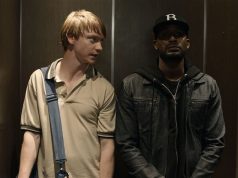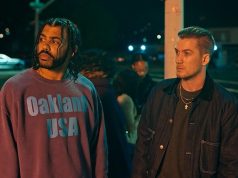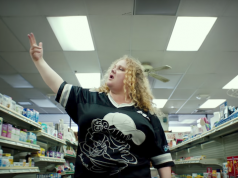One of the measures of a good biopic is whether it can engage a viewer who has no prior interest in the subject, or whether it just preaches to the choir. I think “Notorious” works. It’s about Christopher Wallace, aka The Notorious B.I.G./Biggie Smalls/Big Poppa, the multi-nicknamed Brooklyn rapper who rose to fame in the mid-1990s and was murdered in 1997, and someone I couldn’t have cared less about. But the movie, a reasonably well-crafted drama made with some skill and a lot of tenacity, held my interest as much as “Walk the Line” or “Ray” did, and it brings rap out of the biopic ghetto and into the mainstream.
Directed by George Tillman Jr. (“Soul Food,” “Men of Honor”), “Notorious” follows the same basic pattern as most films of this genre. You start in the present or with the artist’s death, then jump back to his childhood to catch a few pivotal vignettes, then move quickly through his formative years into adulthood; the subject makes it through the hardscrabble years into sudden success, loses touch with his roots, becomes abusive to his friends, is humbled by injury, illness, or some other setback, and ultimately finds peace and/or dies. One could wish that this formula were not always so closely followed, yet in this case maybe it’s a good idea to stick to the familiar layout in order to make it more palatable to hip-hop-averse viewers.
As an adult, Biggie is played by a newcomer named Jamal Woolard, who turns the obese rhymer into something of a teddy bear, a soft-voiced lug who’s good to his mother and, well, OK, sometimes carries a gun. As a child, he’s played by Biggie’s real-life son, Christopher Jordan Wallace, and his doting mother, Voletta, is played by Angela Bassett. The 1980s are a hard time for their Brooklyn neighborhood, with crack cocaine and other dangers on every corner; Biggie, a nerdy but smart-mouthed kid, finds acceptance and employment in the drug trade.
By 1990, at age 17, he’s making serious money selling crack. (He keeps his lifestyle hidden from his mom by not changing into his bling and expensive sneakers until after he leaves the house.) He’s known for his skill at improvising raps, but it’s not where his focus is. As he puts it, “Drug dealing was like my wife. Rapping was just some girl on the side.”
The mistress becomes his main squeeze when he meets Sean “Puffy” Combs (Derek Luke), an up-and-coming record producer who appreciates Biggie’s talent and gets him out of the drug business and into the recording studio. From there the trajectory should be familiar even if you’ve never heard of The Notorious B.I.G. — you know there will be swanky CD-release parties and willing groupies and baby mama drama. Biggie, already a father thanks to teenage foolishness, takes up with the rapper Lil Kim (Naturi Naughton), then cheats on her with Faith Evans (Antonique Smith), whom he marries impulsively and barely tries to stay faithful to.
As if that weren’t enough melodrama for one man’s life, there is also the matter of the infamous East Coast/West Coast rap rivalry. The film (which was written by Reggie Rock Bythewood and Cheo Hodari Coker) posits that this rivalry is mostly traceable to a rift that developed between Biggie and Tupac Shakur (Anthony Mackie) after the latter was non-fatally shot outside a recording studio where Biggie happened to be at the time. As the movie tells it, Tupac paranoiacally believes Biggie is responsible, an assumption that producer Suge Knight (Sean Ringgold) — a rival to Puffy Combs — is only too happy to perpetuate.
“Notorious” doesn’t explain the details of the West Coast/East Coast rivalry very well, possibly owing to it not being particularly deep to begin with — like college rivalries, it seems to have been based mostly on geography and randomly chosen insults. A little more investigation into the subject might have been prudent, however, since it does lead directly to Biggie’s shooting death in L.A.
Even if rap isn’t your thing, it’s easy to appreciate the skill involved in writing and reciting the stuff, and Woolard (a rapper himself) is able to convey in his performance why Biggie was so popular. Nothing about Biggie’s lyrics suggests transcendent genius, but his consistently spot-on performance of them, coupled with his outre offstage behavior, made him a celebrity. Woolard, who seems to have been born to play this role, captures all that very nicely, aided by winning supporting turns by Bassett, Luke, Naughton, and Smith. Even a non-follower of rap like myself knows an effective story when he sees it.
B (2 hrs., 2 min.; )





